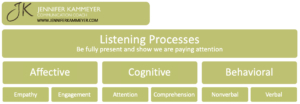2023: The Year of Better Listening
What they are hearing?, I ponder when I see a rabbit darting down a country road with ears perked and pivoting. The visual reminds me of active listening, a skill many of us are still perfecting. In this year of the Water Rabbit, when we can expect calm and reflection, I will focus my research and writing on the communication skill of listening.
The Value of Listening
We intuitively know—and research shows—that good listening has benefits. We feel better when we feel heard and we demonstrate we care by listening to others. Listening improves relationships and makes speakers feel at ease. Listening well gives us information that helps us understand others, making us better problem solvers.
The Challenge of Listening
While important, being a good listener is not easy. Three factors make it challenging. First, we are self-centered beings by nature, and by this I mean that we evolutionarily take care of our needs first for survival. Second, there are many stimuli to distract us, from the obvious such as our smart phones to the not-so-obvious like our perceptions of the person speaking. Third, we tend to think about the past and future much more than we stay in the present moment.
Take this scenario, for example: An important person in our lives starts to tell us about a problem they encountered and we immediately start to think of ways we can fix the issue. We nod our head and say, ‘mmhmm’ and then wait for the earliest opportunity to share the brilliant solution we just generated. Likely this scenario sounds familiar. I spend my life in the realm of effective communication, and it is very familiar to me! And this is a better scenario than an important person in our lives starts to tell us about a problem and our phone buzzes so we look down and see a funny text and smile. But either scenario can leave the other person feeling unheard.
Self-centered, distracted, and not in the moment. These are the enemies of good listening. The friends of good listening? Intention and practice. The tactics can be learned, and with intention and practice our habits can shift.
What Does it Mean to Listen?
The academic definition of listening is “a multidimensional construct that includes affective processes (e.g., exhibiting empathy and engagement), cognitive processes (e.g., attention and comprehension), and behavioral processes (e.g., nodding and asking questions).” (Flynn, et al, 2022). In everyday terms it is paying attention and showing that we are paying attention.
In 2023 I am focusing on the intention and practice of listening. I invite you to join me on this journey, where every month I will present a different aspect of listening and offer up a practice. The first practice is in the category of cognitive processes and it is the act of paying attention.
Practice: Paying Attention
Paying attention means that the mind, body, and emotions are all focused on one thing–in this case, the speaker. That means our thoughts are on that person, that our bodies are still with eyes on the speaker, and that we are emotionally trying to connect to how they feel in the moment. This can be done in person, on video, or over the phone.
Practice Steps:
- Pick one person you will pay full attention to when they speak or you can pick one situation that occurs regularly, such as a team meeting.
- Before conversing with that person or entering into the situation, remind yourself of your intention: “I intend to pay full attention, bringing my focus back to the speaker when it strays.”
- After the conversation or the situation, check in with yourself and note how well you met your intention.
I encourage us all to practice and see what happens. May 2023 be the year we learn to listen better.

